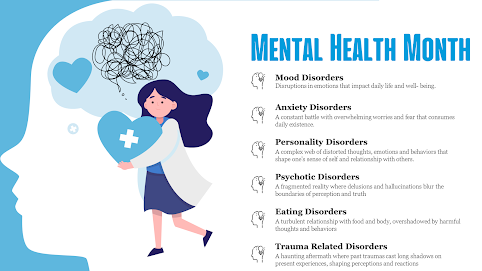Nurturing Mental Health: Harnessing the Power of Herbs Across Different Stages
 |
| Ambe NS Agro Products |
May is Mental Health Month, a time dedicated to raising awareness about mental health and encouraging people to prioritize their emotional well-being. Mental health affects us all, and it's essential to understand the various stages of mental health and the potential benefits that herbs can provide. In this blog, we'll explore the different stages of mental health and how herbs can be a valuable tool in supporting mental well-being.
Stage 1:
Maintenance and Prevention
Just as we
maintain our physical health through regular exercise and a balanced diet, it's
crucial to care for our mental well-being proactively. Herbs such as lavender,
chamomile, and lemon balm are renowned for their calming properties.
Incorporating these herbs into your daily routine, whether through tea,
aromatherapy, or herbal supplements, can help promote relaxation, reduce
stress, and support emotional stability. These herbs can serve as a gentle
nudge towards maintaining a healthy state of mind.
Stage 2:
Stress and Anxiety
Life can
present us with various challenges, and stress and anxiety are natural
responses to these pressures. However, when these feelings become overwhelming
and persistent, they can significantly impact our mental health. Herbs like
ashwagandha, passionflower, and valerian root have been used for centuries to
ease stress and anxiety symptoms. These herbs have adaptogenic properties,
helping the body and mind adapt to stressors while promoting a sense of calm
and tranquility. Incorporating them into your daily routine can support you
during stressful periods.
 |
| Ambe NS Agro Product |
Depression
and persistent low mood can be debilitating, affecting every aspect of life.
While it's essential to seek professional help in these cases, certain herbs
can complement conventional treatments and help alleviate symptoms. St. John's
Wort, known for its antidepressant properties, can help balance mood and uplift
spirits. Additionally, herbs like ginkgo biloba and Siberian ginseng may
enhance cognitive function, memory, and focus, aiding in managing the cognitive
difficulties often associated with depression.
Stage 4:
Recovery and Healing
Recovery
from mental health challenges is a journey that requires time, support, and a
holistic approach. Herbs can play a supportive role during this stage by
promoting relaxation, aiding in sleep, and reducing emotional and physical
tension. Passionflower, lemon balm, and chamomile can be particularly helpful
during this period. Additionally, herbs like rhodiola rosea and holy basil
possess adaptogenic properties that support overall well-being, providing
resilience and helping the body adapt to stressors encountered during the
recovery process.
Stage 5:
Overall Well-being and Self-Care
Mental
health maintenance is an ongoing process, and prioritizing self-care is vital
in promoting overall well-being. Herbs such as lavender, chamomile, and
peppermint can be incorporated into self-care routines. Taking warm baths with
lavender oil, enjoying a cup of chamomile tea, or using essential oils during
aromatherapy sessions are simple yet effective ways to create moments of
relaxation and self-nurturing.
Conclusion:
Mental
health is a complex and deeply personal journey. While herbs can provide
support throughout different stages, it's essential to remember that they are
not substitutes for professional help. If you're experiencing mental health
challenges, seeking guidance from a healthcare professional is crucial.
Incorporating
herbs into your routine can be a holistic way to support mental well-being.
From stress and anxiety management to aiding in recovery and promoting
self-care, herbs offer a gentle yet effective approach to nurturing your mental
health. Let's embrace Mental Health Month by prioritizing self-care,
destigmatizing mental health conversations, and exploring the potential
benefits that herbs can provide on our journey toward emotional well-being.


.png)
Comments
Post a Comment